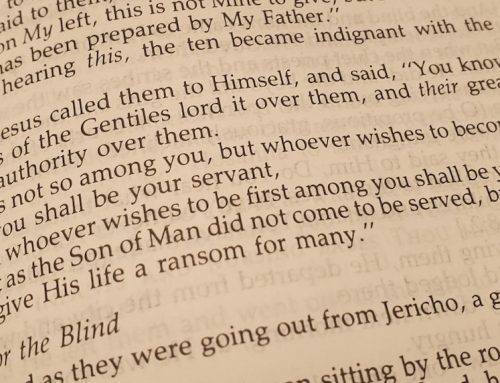One of the most far-reaching mistakes of church history in the last 2000 years was when congregations started colluding to give bishops influence over multiple congregations rather than over a single congregation, as Paul originally established. Bishops are just another word for pastors, elders, presbyters, overseers, or shepherds. Whatever you want to call these local shepherds, they were a God-given form of church oversight to help keep wolves out of the flock. Paul outlined the qualifications for them, and instructed both Timothy and Titus about those qualifications.
The only problem was that human ideas for church management (and control) just seemed so much more practical. The congregation in Rome—not unlike Stanton or Spring Valley—asked for, and received the deference of its peers. Their bishops began to assert their influence and growing authority over the bishops in nearby congregations. Thus there became an established hierarchy of bishop preeminence over multiple congregations, not based on Scriptural authority, but based on tradition. Rome was, after all, the most prestigious of the churches in existence at the time.
Eventually, regional control wasn’t enough, and Rome’s bishops would claim preeminence among the entire body of bishops. In a classic case of the frog getting cooked in the hot water, it wasn’t a big step from there for a single bishop to be lifted to preeminence as the “first among equals” as il papa, the Pope.
Control the bishops, you control the churches. Hierarchical authority structures are so much easier to manage for those at the top, but not so much for the peasants under their authority. The hierarchical structure is great for building an empire. But it’s not how God designed the Kingdom:
1 Peter 5:1-4 – To the elders among you, I appeal as a fellow elder and a witness of Christ’s sufferings who also will share in the glory to be revealed: 2 Be shepherds of God’s flock that is under your care, watching over them—not because you must, but because you are willing, as God wants you to be; not pursuing dishonest gain, but eager to serve; 3 not lording it over those entrusted to you, but being examples to the flock. 4 And when the Chief Shepherd appears, you will receive the crown of glory that will never fade away.
Fast forward in history, and we find that the First Council of Nicaea was a gathering of bishops sent as delegates from the local churches for the purpose of ironing out various issues of disagreement among the churches. Sound familiar? Commenced on May 20, 325 A.D, it was, ironically enough, the first May Meeting. It was justified using the same premises Stanton uses to authorize their May Meetings: The need for unanimity in doctrine, and the example of Acts 15 for how to get it.
However, I’m not as interested in the May Meeting angle of this right now as I am the Teacher > Bishop > Elder angle. Why? Because the Stanton churches, through ignorance of history and the Scriptures, perhaps, have followed the same mistake of the early Catholic Church by granting individuals control (or undue influence, if you prefer) over multiple congregations.
How is it that we have clear Biblical qualifications for elders (husband of one wife, leads his family well, etc.), yet they are absent in the Stanton churches? Stanton’s Main Teachers, on the other hand, oversee all the congregations, yet are entirely absent in Scripture. How do you justify that for over 50 years? How many times do we see a local teacher in Scripture sending for outside counsel from a Main Teacher at another church? Zip, zero, nada. Not once.
In fact, “Main Teacher,” “Local Teacher,” and “Outside Counsel” are terms found nowhere in Scripture. If we follow the maxim to use Bible words for Bible things, perhaps the absence of Bible words for this model of church authority should clue us in to the fact that it is—let’s go out on a limb here—unbiblical.
Local teachers have clearly taken the place of Biblical elders, for all intents and purposes. In Stanton’s own words, they are “in lieu of elders.” Yet with more power than elders, they are not required to meet the qualifications of elders. Are they husbands of one wife (many are women), or do they even have “faithful children,” as elders are required to have, for that matter? After all, if you can’t lead your own home, Paul says, what business do you have leading the church?
And local teachers are expected to ask outside counsel of Main Teachers, are they not? So whatever lip service is given to congregational autonomy, in practice we have the evangelist over main teachers over local teachers over the congregation. Evangelist > Main Teachers > Local Teachers. Now do you see how the Main Teachers are the new Catholic-style bishops—i.e., overseers of multiple congregations?
So let’s just be honest that this is the way the Stanton churches function in realty. I know for a fact that local teachers have come under suspicion for simply not asking the main teachers for enough outside counsel. That’s because there are clear expectations of deference to your superiors in the pecking order.
I’m not suggesting these teachers are bad people, or ill-intentioned. They most likely have the best of intentions. But they are exercising influence/power/authority that is not granted by Scripture. That’s all. Nothing personal.
Local teachers, in practice if not by intent, have usurped the authority given to Biblical elders. Really, they’ve exceeded it. And Main Teachers have taken the place, not just of the Biblical elders as described by Paul, but worse, of the first century apostles, and the unbiblical second and third century bishops. For those who have been in the sect for decades, it should be easy to see how this system of church government arose a little bit at a time, like the frog in the hot water. But beware, because those who don’t know history are doomed to repeat it.
Congregations need to reign it back in and assert local control, as it was in the first century, to avoid the mistakes of the second and third centuries. But who am I to offer any advice? I’m just a peasant with a Bible. I guess that’s the point, though. Aren’t we all just peasants with Bibles who answer to our King, and not to any man? May it ever be so.






This kind of clear thinking is 'dangerous' but only dangerous to maintaining the unholy alliances that have crushed so many honest God fearing souls …please continue to publish these simple truths…bless you Kevin. (M.F.Welch mfw888888@aol.com)
Kevin, you hit the nail on the head 100%. I appreciate the fact that you are not out to attack the individuals who are not bad people nor ill-intentioned but you are pointing out unscriptural practices that need to stop.
Thank you!
Spiritual authority has limits to spiritual matters, in the SCOC they try and exercise authority over every of life thus if you take away spiritual and leave authority you have the SCOC. I told my wife when we were first married that I needed to open up an IRA for retirement and the next bible class the woman teacher from Albuquerque put out teaching that we need not worry about retirement because "something" will be there. This woman, though she had a nursing degree, was a stay at home mom, and felt it her place to put out teaching on… Read more »
One of the practices that goes way back to the very beginning is the lack of privacy. Couples have a right to have conversations in private without "counselors" working their way into the relationship. My dad told me that the women at Stanton recorded some conversations with him and sent them to Merie for "counsel." This is highly unbiblical and despicable, really. But stories like yours Anon 7:54, confirm that it happens all the time.
I might add that in California, it's illegal to record conversations without the consent of the parties in it.
Thank you Kevin, yes the preachers/teachers "authority" goes way beyond what any bishop/elder would do; they are totalitarian, trying to control every area of a followers life. (and often when they themselves had no knowledge or experience in the area.) I have been told to quit jobs, where to live and with whom, how to handle student loans, not to consume caffeine, not to have sex on Sundays, and many other things, all from the teachers or preachers during bible class. I struggled for years trying to understand the scriptural basis for their judgments and finally realized that it was… Read more »
This is one of my favorite posts. It's a little complicated but it's worth reading a few times. It seems to me that if THIS issue were resolved, a lot of the SCOC issues would die out. It would have such a trickle-down effect if true elders led the flock without outside counsel. Suddenly scriptural authority would be in place and things would improve. But alas, after almost 50 years there is still lip service in every congregation and in every May week that they are aiming to have elders. They should find 3 or 4 proven men and do… Read more »
Yes. If all congregations were under purely localized elderships, there would be no Stanton. Period.
Seeking, Craig or anyone else who has recently left Stanton, what are some of the teachings you feel you were forced to comply with that you are most happy to be free from?
Seeking council, or getting permission to do anything. You don't share in class without first getting permission and the teaching preacher going over what you are going to share before hand. You don't just start the personal work when you get to an apartment complex you wait for the teaching preacher to arrive and tell you where to go. You don't get a second job on Saturdays without getting permission to do so first. And on and on and on; micromanaging to death.
I feel like my CONSCIENCE is free to search the scriptures and come to understandings myself. I felt guilty so many times for not speaking out. What I am no longer complying with is being an accomplice to hurting others as well as no longer living in constant fear of MAN.